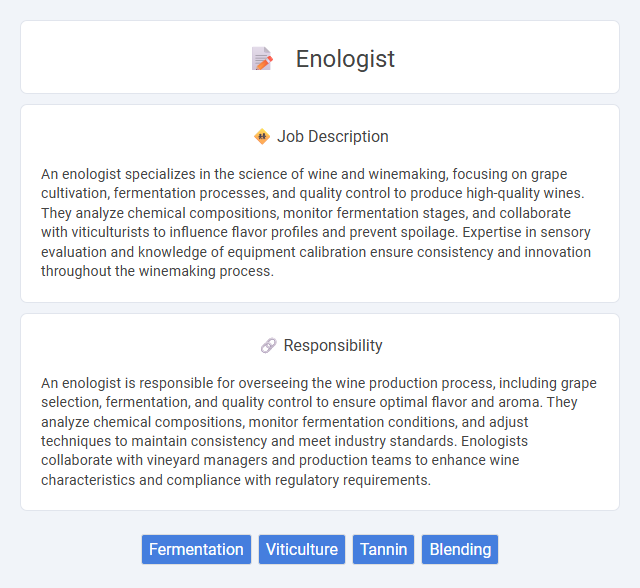
An enologist specializes in the science of wine and winemaking, focusing on grape cultivation, fermentation processes, and quality control to produce high-quality wines. They analyze chemical compositions, monitor fermentation stages, and collaborate with viticulturists to influence flavor profiles and prevent spoilage. Expertise in sensory evaluation and knowledge of equipment calibration ensure consistency and innovation throughout the winemaking process.
People with a strong passion for wine and an analytical mindset are likely to be well-suited for a career as an enologist. Those who can tolerate long hours in laboratory and vineyard environments and possess attention to detail may find this job fulfilling. Individuals who enjoy combining science with creativity could have a higher probability of success in this role.
Qualification
An enologist typically holds a degree in enology, viticulture, or a related field such as food science or chemistry, ensuring expertise in grape cultivation, fermentation, and wine production processes. Professional certifications from recognized institutions like the Society of Wine Educators or the Institute of Masters of Wine enhance credibility and technical knowledge. Hands-on experience in wineries or laboratories, combined with skills in sensory analysis and quality control, are essential qualifications for excelling in this specialized role.
Responsibility
An enologist is responsible for overseeing the wine production process, including grape selection, fermentation, and quality control to ensure optimal flavor and aroma. They analyze chemical compositions, monitor fermentation conditions, and adjust techniques to maintain consistency and meet industry standards. Enologists collaborate with vineyard managers and production teams to enhance wine characteristics and compliance with regulatory requirements.
Benefit
An enologist will likely experience benefits such as enhanced expertise in wine production, which can lead to higher-quality wines and improved marketability. The role may offer opportunities for collaboration with vineyards and marketing teams, potentially increasing professional recognition and career advancement. Financial incentives might arise from successful wine batches or innovations, contributing to overall job satisfaction.
Challenge
An enologist likely faces the challenge of precisely balancing the complex chemical and biological processes involved in winemaking to ensure consistent quality. Managing unexpected variations in grape composition and fermentation conditions may require swift problem-solving skills. They probably encounter ongoing scientific and environmental challenges that demand continuous adaptation and innovation in winemaking techniques.
Career Advancement
An enologist specializing in wine science can advance to roles such as head winemaker, cellar master, or vineyard manager by gaining expertise in fermentation techniques, quality control, and sensory analysis. Continuous professional development through certifications and participation in industry conferences enhances career prospects. Leadership in sustainable practices and innovative wine production further distinguishes enologists in competitive markets.
Key Terms
Fermentation
Enologists specialize in the science of fermentation, harnessing yeast and microbial processes to convert grape sugars into alcohol and develop complex wine flavors. They monitor and control temperature, pH levels, and fermentation duration to ensure optimal biochemical reactions and desired sensory profiles. Mastery of fermentation dynamics directly impacts wine quality, stability, and aging potential, making enologists essential in viticulture and winemaking industries.
Viticulture
An enologist specializes in the scientific study and practical application of winemaking, with a strong focus on viticulture--the cultivation and harvesting of grapevines. Mastery of vineyard management techniques, grape variety selection, soil analysis, and climate impact is essential to optimize grape quality for fermentation. Enologists collaborate closely with viticulturists to ensure grape production aligns with desired wine profiles, enhancing overall production efficiency and wine excellence.
Tannin
Enologists specialize in analyzing and managing tannin levels during the winemaking process to enhance wine structure, texture, and aging potential. Tannins, derived primarily from grape skins, seeds, and oak barrels, play a crucial role in balancing acidity and bitterness while contributing to the wine's mouthfeel. By monitoring tannin extraction and polymerization, enologists ensure optimal flavor development and stability in red and some white wines.
Blending
Enologists specializing in blending utilize advanced sensory evaluation techniques and chemical analysis to create harmonious wine profiles that balance flavor, aroma, and texture. Expertise in selecting grape varieties, fermentation methods, and aging processes allows enologists to craft blends that maximize complexity and market appeal. Mastery in blending contributes significantly to the consistency and quality control of premium wines across vintages.
 kuljobs.com
kuljobs.com